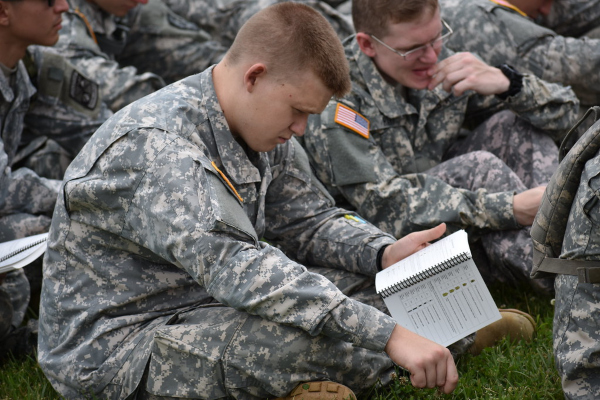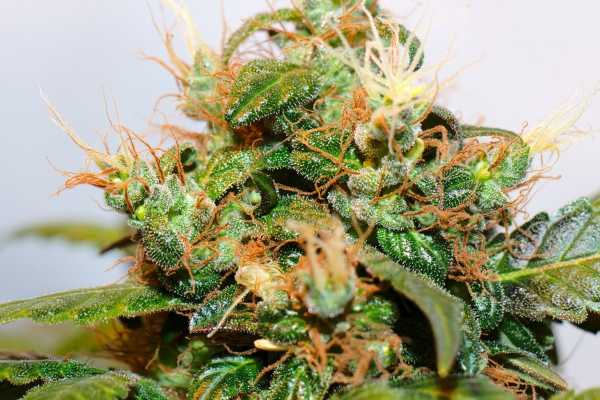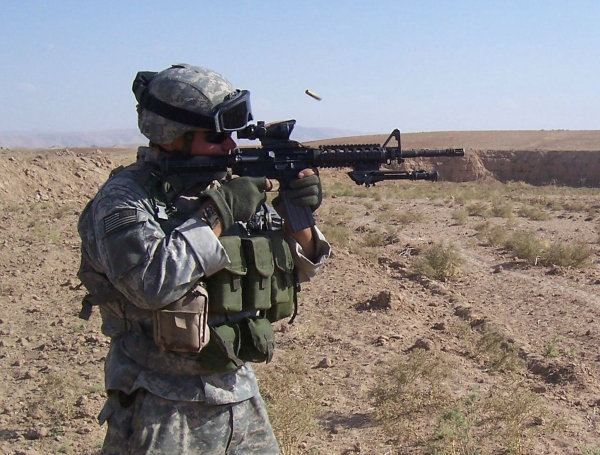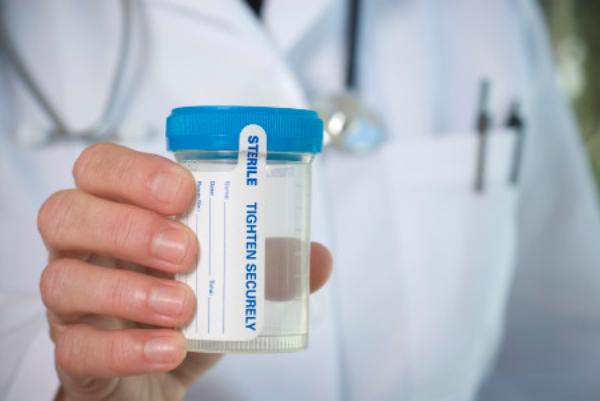If you want to be successful in the U.S. Armed Forces, you should avoid drugs and alcohol.
While these substances may offer short-term relief from stress and anxiety, the long-term effects are largely damaging.
It is why soldiers, sailors, and airmen must pass a military drug test at boot camp, as well as periodically throughout their careers.
The military sternly enforces its drug policy with zero tolerance for illicit substances.
Learn more about the military drug test performed at MEPS, as well as ongoing drug testing conducted in each branch.
Related Article – Your Complete Guide To MEPS
Table of Contents
When Does The Military Conduct Drug Testing?

New recruits (regardless of military branch) must pass a military drug test prior to boot camp.
The initial military drug test is conducted at a Military Entrance Processing Station (MEPS).
After your first drug test, soldiers may be subject to random or probable cause testing.
Consequently, it is in your best interest to avoid drug use during your time in service.
The reprimands for failing a military drug test are noteworthy and could lead to you getting kicked out of the military altogether.
Therefore, most do not find it worth the risk to use drugs during service.
Moreover, many abstain from alcohol or tobacco to maintain peak physical fitness and mental competence.
Let’s examine the 3 different types of military drug tests utilized by the Department of Defense (DoD):
- Drug Testing at MEPS
- Random Testing
- Probable Cause Testing
Drug Testing at MEPS
In general, a Military Entrance Processing Station (MEPS) is one of your first destinations in your quest to become a member of the US military.
The Department of Defense uses MEPS to process new recruits for the Army, Navy, Air Force, Marines, and Coast Guard.
The primary purpose of MEPS is to evaluate new recruits from a physical and psychological standpoint.
As a result, recruits that arrive at MEPS are expected to pass the physical examination along with a military drug test.
It is standard procedure as most organizations and employers screen candidates in advance for drugs or alcohol.
For this reason, it is important to abstain from drugs and alcohol prior to arrival at MEPS.
It will not only assist you in passing the MEPS drug test but give you an advantage in boot camp over other recruits that do not arrive as physically prepared.
The Military Entrance Processing Station must determine under military regulations, policies, and federal law that you are qualified for service.
MEPS traditionally uses urinalysis to test for illicit substances (including marijuana and steroids).
You do not have a right to refuse the military drug test so make sure that you are prepared for testing by doing the right thing.
Like it or not, maintaining a clean lifestyle free from drug use is part of your service obligations.
Failure to meet these expectations or testing positive can prevent you from progressing to boot camp.
So, don’t ignore the importance of the MEPS examination, which includes a drug test.
Related Article – Can You Join The Military With A Felony?
Random Testing
The Department of Defense (DoD) processes 60,000 random drug tests each month.
There is not a branch of the military that is exempt from random military drug tests.
Troops do not have the right to reject a military drug test for any reason.
Random testing occurs frequently with all active duty members having to undergo at least one urinalysis per year.
Random testing – as the name implies – is designed to be completely arbitrary.
However, the term is a little misleading as there are accounts where a commander orders all of a selected unit to undergo testing at the same time.
Nonetheless, it is important to understand that random drug testing will be part of your service obligation.
Consequently, it is a bad idea to continue and use drugs (even alcohol or tobacco) during service because the chances of getting caught are very realistic.
The results from a random test are punishable under 15 (nonjudicial punishment) of the Uniform Code of Military Justice.
In accordance, the military can use the results to determine service characterization (honorable, general, or other-than-honorable).
Probable Cause Testing
Probably cause testing is different from random testing.
The type of military drug test is used when a commander has suspicion to believe that an individual under their watch is under the influence.
In the military, the commander has the right to request search authorization from the Installation Commander.
The Installation Commander is authorized to issue military search warrants, which usually include a urinalysis.
Keep in mind that results from a urinalysis that is obtained through search authorizations can be used in a court-martial.
Furthermore, it can lead to service characterization and involuntary discharges.
Once again, you do not have the right to refuse to submit a urinalysis in probable cause military drug tests.
Notwithstanding, the situation can get a little complicated if the commander does not have probable cause yet asks the service member for “consent to search.”
In this situation, the service member does not have to grant consent and should understand the complications of doing so.
Regardless, a military drug test can still be ordered under the direction of a commander. However, the results from the urinalysis may not be used for court-martial purposes.
However, the results can still be used as a reason for involuntary discharge.
In the end, avoiding drug use while serving in the military is the most surefire way to pass a urinalysis.
Related Article – Dishonorable Discharge: Reasons, Consequences, and More
U.S. Military Drug Test Policy (by military branch)

The military drug test applies to every branch of the U.S. Armed Forces.
Nonetheless, each military branch enforces a slightly different drug policy:
Army Drug Test Policy
The United States Army follows the standard drug test policy carried out by the Department of Defense.
The urinalysis is the primary method for gathering test results in the U.S. Army.
There are many protections written into the Army drug test policy that ensures accurate results.
For example, the labeling and transportation of test samples involve an intricate process in which everyone that handles the batch must sign a legal document indicating nothing has been altered or distorted.
The chain-of-custody requirement continues into the lab where the urine samples are studied.
The Army enforces these policies strictly to guarantee the results from each urine sample are accurate.
Navy Drug Test Policy
The U.S. Navy follows similar procedures to the Army in relation to drug testing.
The military branch also relies on forensic urine drug tests as its primary policing method for combating illegal drug use.
As a result, the Navy follows a strict labeling and procedure process once the sample leaves the hands of the soldier to verify accurate results.
Sailors are subject to random testing and probable cause testing, along with the initial requirements at MEPS.
The U.S. Navy offers a substance abuse program for service members that are struggling to get clean.
You’ll find similar support networks in the other branches of the military as well.
Air Force Drug Test Policy
It is not surprising that the United States Air Force is at the leading edge of technology and innovation.
Therefore, the military branch employs a thorough and accurate system for monitoring drug tests.
Urine samples that arrive at an Air Force lab (like the other military branches) undergo an initial immunoassay screening.
The Air Force drug test policy states that personnel who test positive for the presence of drugs at this point in the screening need to complete a second screening.
The second screening can either support or dismiss the positive results from the first test.
Subjects that test positive for multiple screenings are put through a more robust gas chromatography / mass spectrometer test.
The second military drug test is more thorough and can identify specific substances.
Nonetheless, if a particular drug is detected, so long as it falls below a certain threshold – the result will return “negative.”
Marines Drug Test Policy
The United States Marine Corps enforces a drug policy just like the other primary military branches.
Service members that are in the Marines are expected to maintain a healthy lifestyle that includes abstaining from drugs and alcohol.
For this reason, the Marine drug test policy is comparable to other military branches.
The Marine Corps utilizes DoD labs to test for marijuana, cocaine, barbiturates, opiates, and amphetamines.
Moreover, legal substances that show up in your system but for which you do not have a prescription usually fall under the same category of illicit substances.
Therefore, make sure you are clear with MEPS during processing about any prescription medications that you are currently taking or have recently in the past.
Coast Guard Drug Test Policy
The U.S. Coast Guard may not get the same love as other military branches yet maintaining a clean lifestyle is just as important, if not more.
Coasties are very skilled in the water and usually in excellent physical shape.
As a result, the U.S. Coast Guard discourages alcohol and drug use just like the other military branches.
New recruits in the Coast Guard (along with other military branches) are getting tested harder than ever before.
In fact, the current new recruit in any military branch is tested for more than 25 substances.
For this reason, it is a good idea to make yourself aware of the Coast Guard drug test policy prior to MEPS to make sure you are avoiding all the illicit substances (listed, below).
Related Article – Military Banned Supplements List
What Types of Drugs Are You Tested For?

Department of Defense labs that conduct drug testing are highly advanced and equipped.
The military drug test checks for the usual suspects including:
- Amphetamines
- Barbiturates
- Cocaine
- Opiates (These include Oxycodone, Roxycodone, Oxycontin, Fentanyl, Hydrocodone, Morphine, Heroin, Oxymorphone, and Codeine)
- MDMA (aka ‘Molly’ or ‘Ecstasy’)
- MDA
- Benzodiazepines (i.e. Xanax, Ativan, Klonopin, and Valium)
- Marijuana (both synthetic and actual)
All in all, the Department of Defense monitors over 25 different substances, some of which are found in prescription medication.
However, not every substance is tested in every military drug test.
Nonetheless, popular recreational drugs like cocaine, ecstasy, and marijuana are constantly tested.
The DoD tests for the following substances based on their concentration in your body in nanograms per milliliter.
As you’ll notice in the table (below), the military has a “screening level” and “confirmation level” for each drug.
The confirmation level (meaning you test positive) is sometimes lower compared to the screening level for certain substances.
These levels are set by DoD Instruction 1010.16.
| Drug | Screening Level | Confirmation Level |
|---|---|---|
| Amphetamines | 500 | 100 |
| Barbiturates | 200 | 100 |
| Cocaine | 150 | 100 |
| Codeine | 2000 | 2000 |
| Heroin (6 MAM) | 10 | 10 |
| Hydrocodone | 300 | 100 |
| Methamphetamine | 500 | 100 |
| MDA/MDMA (Ecstasy) | 500 | 500 |
| Morphine | 2000 | 4000 |
| Oxycodone | 100 | 100 |
| Oxymorphone | 100 | 100 |
| PCP | 25 | 25 |
| THC (Marijuana) | 50 | 15 |
Substances to Avoid
Marijuana (THC) is a notorious culprit as it is now legal for medical use in 38 states and recreational use in 20 states, yet still illegal under federal law.
Consequently, the Department of Defense shares the federal opinion on marijuana which means you must abstain from it if you plan on serving (even if you are of legal age and jurisdiction).
The same golden rule applies to alcohol and tobacco.
While the DoD does not monitor these substances in its drug test, keep in mind that it is still illegal to be in possession of these substances prior to your 21st birthday.
Since many recruits arrive at MEPS before they turn of legal age, it is important to abide by the law.
Lastly, make sure you become aware of how long a particular substance may remain in your body after discontinuing use.
For example, it only takes a few days for cocaine or opiates to leave your system compared to THC (marijuana), which can be detected 1-3 weeks after the last known use.
How Do I Get The Results Of My Drug Test?
There are technical terms to describe the various types of military drug tests performed on service members.
In general, a “panel” refers to the number of substances that are being tested in a particular test.
For example, a “10-panel drug test” is a common type of screening that checks for the 10 most common illicit substances.
The DoD currently uses a 26-panel drug test on service members.
Urine tests are popular in the military because they are easy to get samples and the turnaround time is quick.
Consequently, most service members receive the test results from a urinalysis 4-6 days after submitting a sample.
The military does provide a second screening for results that detect flagged substances.
The second screening is generally another urinalysis, which can lead to a more sophisticated type of military drug test if the results come back similar.
Military personnel are allowed to obtain test results from both positive and negative results.
Keep in mind that “positive” is bad in medical lingo, as it implies that you tested positive for one or more illicit substances.
What Happens If You Fail A Drug Test?

The U.S. Armed Forces oversee an extensive drug testing program.
It begins at MEPS, where every new recruit must pass a military drug test to continue to boot camp.
Secondly, military personnel are constantly under monitoring via random testing or probable cause/commander-directed testing.
Military drug tests are equipped to flag levels of marijuana, cocaine, opiates, and amphetamines.
Additionally, the military drug test may check for steroids.
Moreover, substances that show up in your body that are found in medication without a verifiable prescription less than 6 months old also falls under the same category.
There are serious consequences to failing a military drug test.
For starters, annual drug test results along with random tests can be used in court-martials.
Furthermore, positive test results may factor into involuntary discharges that include a negative service characterization.
Your Rights
Military personnel do not have the same rights as everyday citizens and are not allowed to refuse to submit a sample.
The only exception is when a commander does not have probable cause yet requests a urine sample through consent.
The service member has the right to refuse the request but still may have to provide a sample under a military search warrant.
Consequently, failing to provide consent can save you from a poor service characterization. And it can still lead to involuntary discharge.
It does help to understand your limited rights when dealing with consent to submit a drug sample (that is not part of the random selection process).
Nonetheless, the best method for achieving a negative test result is to avoid using any of the drugs that are tested in the military long before reaching MEPS.
Military drug tests are accurate and contribute to serious reprimand or removal from a post.
Conclusion
It is important you understand the consequences of testing positive for drugs in the U.S. Military.
The Armed Forces heavily regulate drug use by performing entrance drug screenings at MEPS.
Furthermore, active-duty personnel are constantly subjected to random testing and may have to submit a sample under probable cause.
The punishments for a positive drug test are severe and can lead to removal from a service obligation.
For this reason, we suggest that you avoid experimenting with drugs in the first place and show up at MEPS completely sober.
- Ikon Pass Military Discount: Learn How To Save Big - January 31, 2025
- RTIC Military Discount: Find Out How To Save Big on Gear - January 30, 2025
- Traeger Military Discount: Learn How To Save Big on Smokers - January 28, 2025


